Essay: Protecting the Rights of Human Research Participants in Studies
VerifiedAdded on 2022/09/18
|7
|1454
|16
Essay
AI Summary
This essay delves into the crucial topic of protecting the rights of human research participants. It begins by highlighting the historical context, referencing unethical experiments like those conducted by Nazi doctors and the Tuskegee Syphilis Study, which led to the development of ethical guidelines like the Nuremberg Code and the Belmont Report. The essay emphasizes the importance of informed consent, minimizing risks, and using appropriate research methods. It identifies vulnerable populations, including children, prisoners, and cognitively impaired individuals, and discusses the special considerations needed to protect their wellbeing. The essay also discusses the three ethical principles of the Belmont Report: respect for persons, beneficence, and justice. The essay concludes by underscoring the importance of ethics in research, emphasizing that ethical practices ensure the expansion of knowledge and support core values like teamwork, respect, and justice. It stresses the need to adhere to IRB standards to ensure accuracy and reliability in research, ultimately benefiting both the subjects and the broader population.
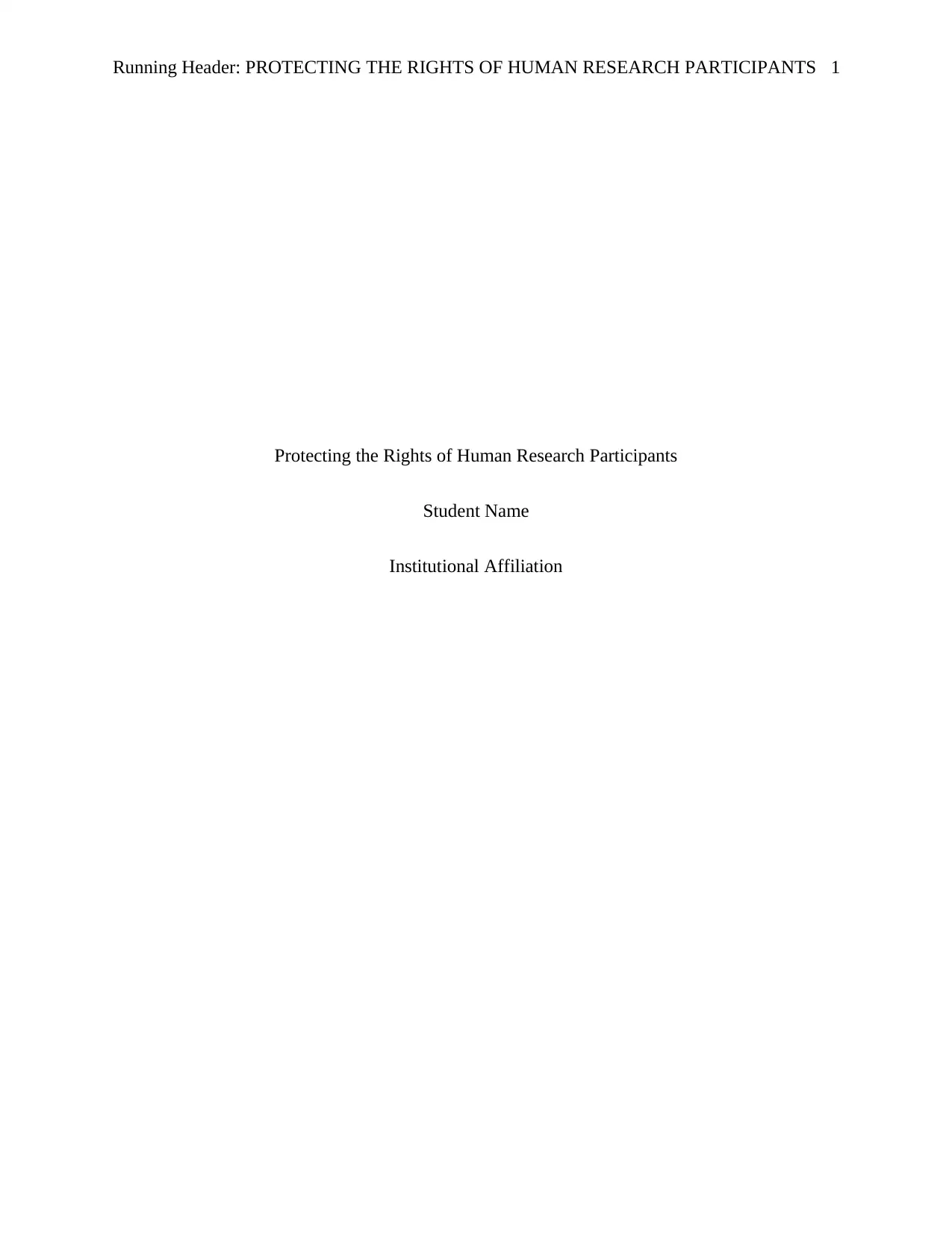
Running Header: PROTECTING THE RIGHTS OF HUMAN RESEARCH PARTICIPANTS 1
Protecting the Rights of Human Research Participants
Student Name
Institutional Affiliation
Protecting the Rights of Human Research Participants
Student Name
Institutional Affiliation
Paraphrase This Document
Need a fresh take? Get an instant paraphrase of this document with our AI Paraphraser
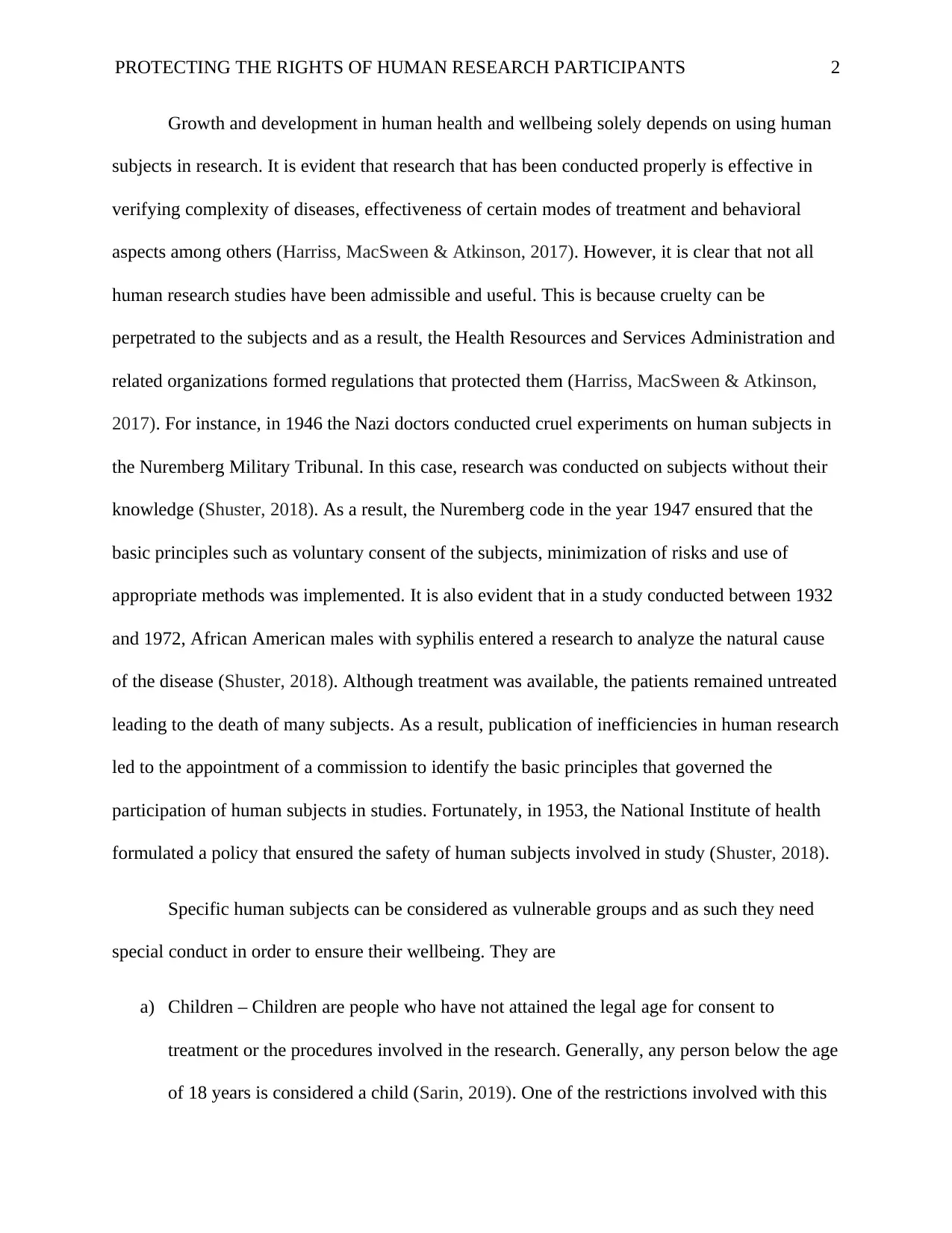
PROTECTING THE RIGHTS OF HUMAN RESEARCH PARTICIPANTS 2
Growth and development in human health and wellbeing solely depends on using human
subjects in research. It is evident that research that has been conducted properly is effective in
verifying complexity of diseases, effectiveness of certain modes of treatment and behavioral
aspects among others (Harriss, MacSween & Atkinson, 2017). However, it is clear that not all
human research studies have been admissible and useful. This is because cruelty can be
perpetrated to the subjects and as a result, the Health Resources and Services Administration and
related organizations formed regulations that protected them (Harriss, MacSween & Atkinson,
2017). For instance, in 1946 the Nazi doctors conducted cruel experiments on human subjects in
the Nuremberg Military Tribunal. In this case, research was conducted on subjects without their
knowledge (Shuster, 2018). As a result, the Nuremberg code in the year 1947 ensured that the
basic principles such as voluntary consent of the subjects, minimization of risks and use of
appropriate methods was implemented. It is also evident that in a study conducted between 1932
and 1972, African American males with syphilis entered a research to analyze the natural cause
of the disease (Shuster, 2018). Although treatment was available, the patients remained untreated
leading to the death of many subjects. As a result, publication of inefficiencies in human research
led to the appointment of a commission to identify the basic principles that governed the
participation of human subjects in studies. Fortunately, in 1953, the National Institute of health
formulated a policy that ensured the safety of human subjects involved in study (Shuster, 2018).
Specific human subjects can be considered as vulnerable groups and as such they need
special conduct in order to ensure their wellbeing. They are
a) Children – Children are people who have not attained the legal age for consent to
treatment or the procedures involved in the research. Generally, any person below the age
of 18 years is considered a child (Sarin, 2019). One of the restrictions involved with this
Growth and development in human health and wellbeing solely depends on using human
subjects in research. It is evident that research that has been conducted properly is effective in
verifying complexity of diseases, effectiveness of certain modes of treatment and behavioral
aspects among others (Harriss, MacSween & Atkinson, 2017). However, it is clear that not all
human research studies have been admissible and useful. This is because cruelty can be
perpetrated to the subjects and as a result, the Health Resources and Services Administration and
related organizations formed regulations that protected them (Harriss, MacSween & Atkinson,
2017). For instance, in 1946 the Nazi doctors conducted cruel experiments on human subjects in
the Nuremberg Military Tribunal. In this case, research was conducted on subjects without their
knowledge (Shuster, 2018). As a result, the Nuremberg code in the year 1947 ensured that the
basic principles such as voluntary consent of the subjects, minimization of risks and use of
appropriate methods was implemented. It is also evident that in a study conducted between 1932
and 1972, African American males with syphilis entered a research to analyze the natural cause
of the disease (Shuster, 2018). Although treatment was available, the patients remained untreated
leading to the death of many subjects. As a result, publication of inefficiencies in human research
led to the appointment of a commission to identify the basic principles that governed the
participation of human subjects in studies. Fortunately, in 1953, the National Institute of health
formulated a policy that ensured the safety of human subjects involved in study (Shuster, 2018).
Specific human subjects can be considered as vulnerable groups and as such they need
special conduct in order to ensure their wellbeing. They are
a) Children – Children are people who have not attained the legal age for consent to
treatment or the procedures involved in the research. Generally, any person below the age
of 18 years is considered a child (Sarin, 2019). One of the restrictions involved with this
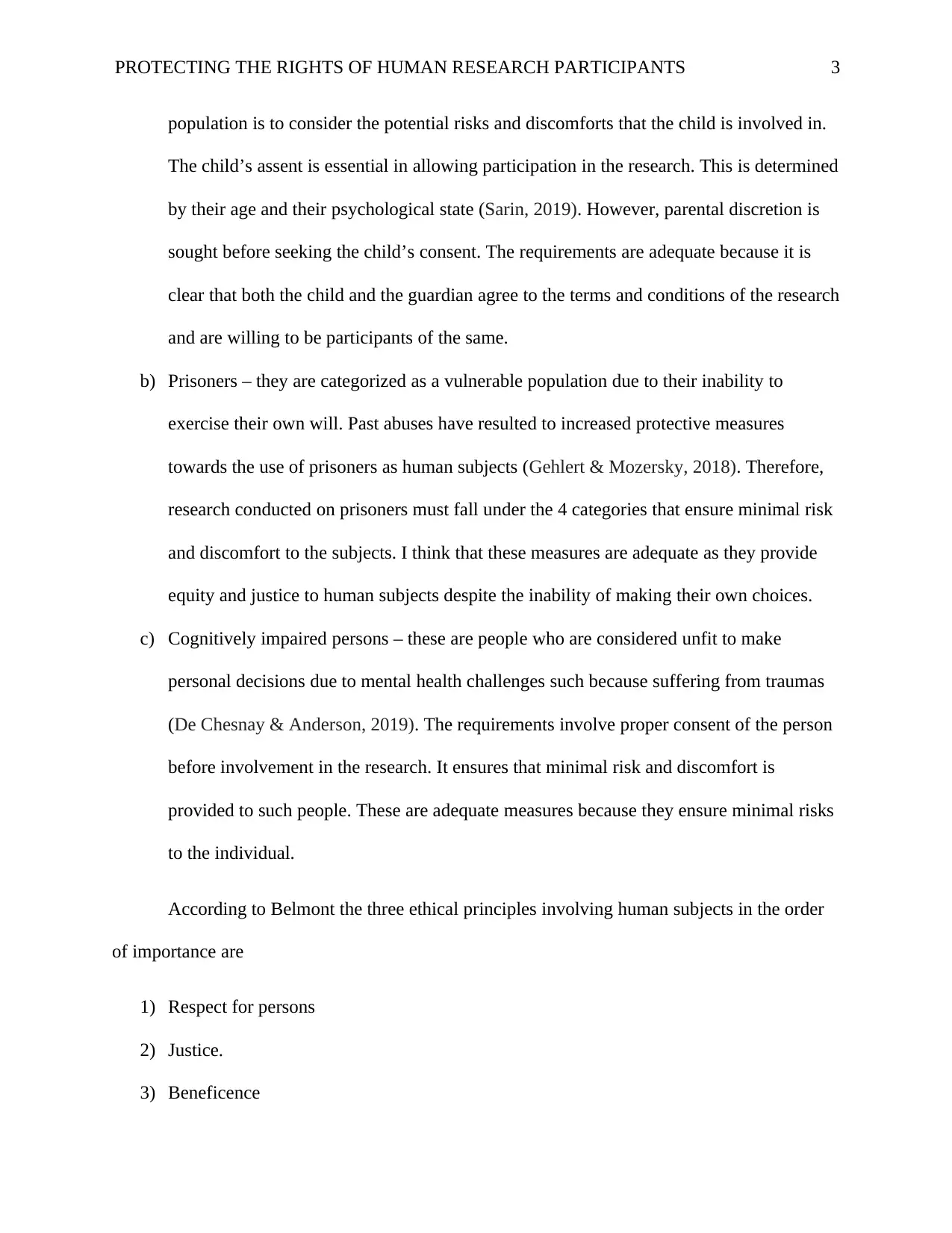
PROTECTING THE RIGHTS OF HUMAN RESEARCH PARTICIPANTS 3
population is to consider the potential risks and discomforts that the child is involved in.
The child’s assent is essential in allowing participation in the research. This is determined
by their age and their psychological state (Sarin, 2019). However, parental discretion is
sought before seeking the child’s consent. The requirements are adequate because it is
clear that both the child and the guardian agree to the terms and conditions of the research
and are willing to be participants of the same.
b) Prisoners – they are categorized as a vulnerable population due to their inability to
exercise their own will. Past abuses have resulted to increased protective measures
towards the use of prisoners as human subjects (Gehlert & Mozersky, 2018). Therefore,
research conducted on prisoners must fall under the 4 categories that ensure minimal risk
and discomfort to the subjects. I think that these measures are adequate as they provide
equity and justice to human subjects despite the inability of making their own choices.
c) Cognitively impaired persons – these are people who are considered unfit to make
personal decisions due to mental health challenges such because suffering from traumas
(De Chesnay & Anderson, 2019). The requirements involve proper consent of the person
before involvement in the research. It ensures that minimal risk and discomfort is
provided to such people. These are adequate measures because they ensure minimal risks
to the individual.
According to Belmont the three ethical principles involving human subjects in the order
of importance are
1) Respect for persons
2) Justice.
3) Beneficence
population is to consider the potential risks and discomforts that the child is involved in.
The child’s assent is essential in allowing participation in the research. This is determined
by their age and their psychological state (Sarin, 2019). However, parental discretion is
sought before seeking the child’s consent. The requirements are adequate because it is
clear that both the child and the guardian agree to the terms and conditions of the research
and are willing to be participants of the same.
b) Prisoners – they are categorized as a vulnerable population due to their inability to
exercise their own will. Past abuses have resulted to increased protective measures
towards the use of prisoners as human subjects (Gehlert & Mozersky, 2018). Therefore,
research conducted on prisoners must fall under the 4 categories that ensure minimal risk
and discomfort to the subjects. I think that these measures are adequate as they provide
equity and justice to human subjects despite the inability of making their own choices.
c) Cognitively impaired persons – these are people who are considered unfit to make
personal decisions due to mental health challenges such because suffering from traumas
(De Chesnay & Anderson, 2019). The requirements involve proper consent of the person
before involvement in the research. It ensures that minimal risk and discomfort is
provided to such people. These are adequate measures because they ensure minimal risks
to the individual.
According to Belmont the three ethical principles involving human subjects in the order
of importance are
1) Respect for persons
2) Justice.
3) Beneficence
⊘ This is a preview!⊘
Do you want full access?
Subscribe today to unlock all pages.

Trusted by 1+ million students worldwide
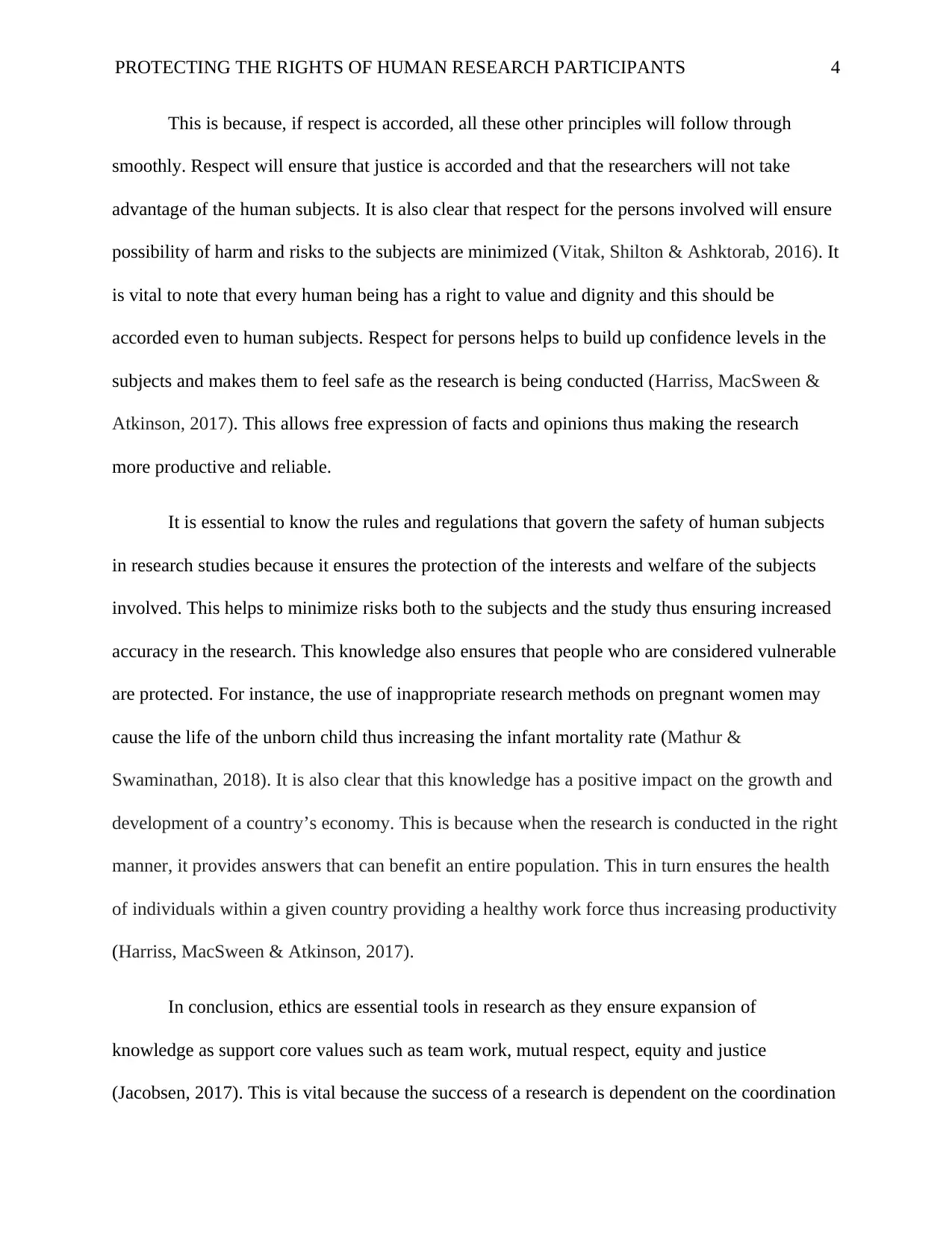
PROTECTING THE RIGHTS OF HUMAN RESEARCH PARTICIPANTS 4
This is because, if respect is accorded, all these other principles will follow through
smoothly. Respect will ensure that justice is accorded and that the researchers will not take
advantage of the human subjects. It is also clear that respect for the persons involved will ensure
possibility of harm and risks to the subjects are minimized (Vitak, Shilton & Ashktorab, 2016). It
is vital to note that every human being has a right to value and dignity and this should be
accorded even to human subjects. Respect for persons helps to build up confidence levels in the
subjects and makes them to feel safe as the research is being conducted (Harriss, MacSween &
Atkinson, 2017). This allows free expression of facts and opinions thus making the research
more productive and reliable.
It is essential to know the rules and regulations that govern the safety of human subjects
in research studies because it ensures the protection of the interests and welfare of the subjects
involved. This helps to minimize risks both to the subjects and the study thus ensuring increased
accuracy in the research. This knowledge also ensures that people who are considered vulnerable
are protected. For instance, the use of inappropriate research methods on pregnant women may
cause the life of the unborn child thus increasing the infant mortality rate (Mathur &
Swaminathan, 2018). It is also clear that this knowledge has a positive impact on the growth and
development of a country’s economy. This is because when the research is conducted in the right
manner, it provides answers that can benefit an entire population. This in turn ensures the health
of individuals within a given country providing a healthy work force thus increasing productivity
(Harriss, MacSween & Atkinson, 2017).
In conclusion, ethics are essential tools in research as they ensure expansion of
knowledge as support core values such as team work, mutual respect, equity and justice
(Jacobsen, 2017). This is vital because the success of a research is dependent on the coordination
This is because, if respect is accorded, all these other principles will follow through
smoothly. Respect will ensure that justice is accorded and that the researchers will not take
advantage of the human subjects. It is also clear that respect for the persons involved will ensure
possibility of harm and risks to the subjects are minimized (Vitak, Shilton & Ashktorab, 2016). It
is vital to note that every human being has a right to value and dignity and this should be
accorded even to human subjects. Respect for persons helps to build up confidence levels in the
subjects and makes them to feel safe as the research is being conducted (Harriss, MacSween &
Atkinson, 2017). This allows free expression of facts and opinions thus making the research
more productive and reliable.
It is essential to know the rules and regulations that govern the safety of human subjects
in research studies because it ensures the protection of the interests and welfare of the subjects
involved. This helps to minimize risks both to the subjects and the study thus ensuring increased
accuracy in the research. This knowledge also ensures that people who are considered vulnerable
are protected. For instance, the use of inappropriate research methods on pregnant women may
cause the life of the unborn child thus increasing the infant mortality rate (Mathur &
Swaminathan, 2018). It is also clear that this knowledge has a positive impact on the growth and
development of a country’s economy. This is because when the research is conducted in the right
manner, it provides answers that can benefit an entire population. This in turn ensures the health
of individuals within a given country providing a healthy work force thus increasing productivity
(Harriss, MacSween & Atkinson, 2017).
In conclusion, ethics are essential tools in research as they ensure expansion of
knowledge as support core values such as team work, mutual respect, equity and justice
(Jacobsen, 2017). This is vital because the success of a research is dependent on the coordination
Paraphrase This Document
Need a fresh take? Get an instant paraphrase of this document with our AI Paraphraser
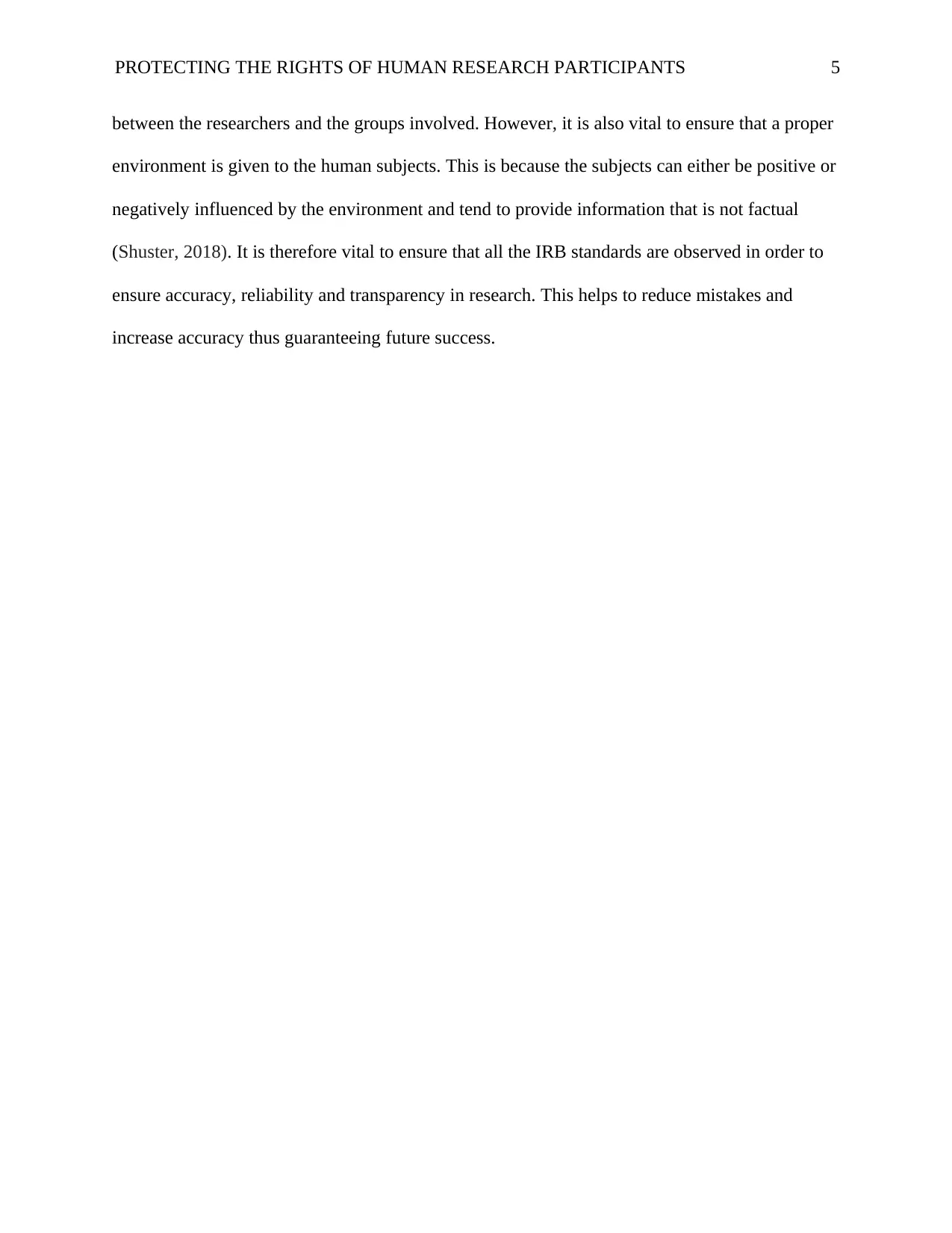
PROTECTING THE RIGHTS OF HUMAN RESEARCH PARTICIPANTS 5
between the researchers and the groups involved. However, it is also vital to ensure that a proper
environment is given to the human subjects. This is because the subjects can either be positive or
negatively influenced by the environment and tend to provide information that is not factual
(Shuster, 2018). It is therefore vital to ensure that all the IRB standards are observed in order to
ensure accuracy, reliability and transparency in research. This helps to reduce mistakes and
increase accuracy thus guaranteeing future success.
between the researchers and the groups involved. However, it is also vital to ensure that a proper
environment is given to the human subjects. This is because the subjects can either be positive or
negatively influenced by the environment and tend to provide information that is not factual
(Shuster, 2018). It is therefore vital to ensure that all the IRB standards are observed in order to
ensure accuracy, reliability and transparency in research. This helps to reduce mistakes and
increase accuracy thus guaranteeing future success.
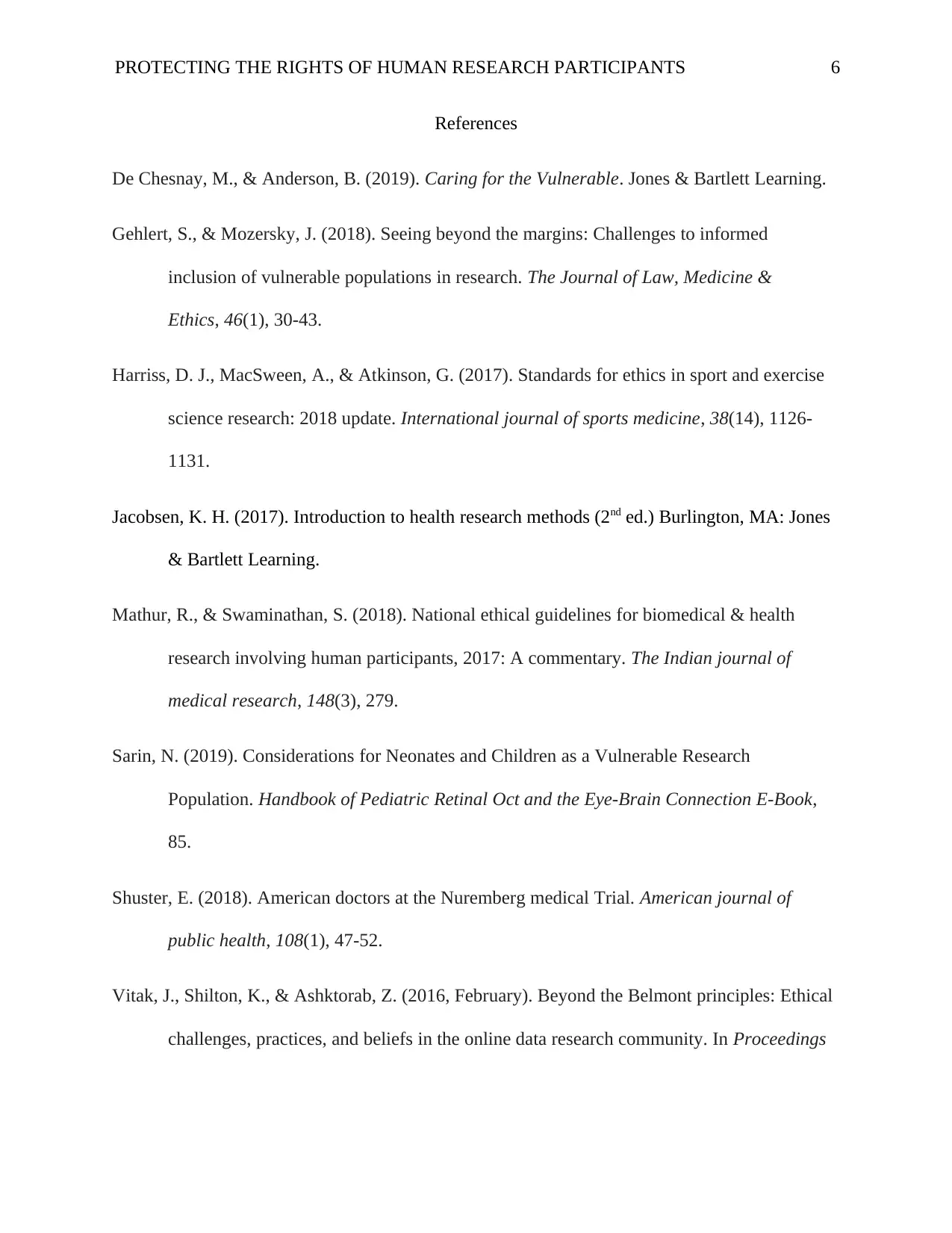
PROTECTING THE RIGHTS OF HUMAN RESEARCH PARTICIPANTS 6
References
De Chesnay, M., & Anderson, B. (2019). Caring for the Vulnerable. Jones & Bartlett Learning.
Gehlert, S., & Mozersky, J. (2018). Seeing beyond the margins: Challenges to informed
inclusion of vulnerable populations in research. The Journal of Law, Medicine &
Ethics, 46(1), 30-43.
Harriss, D. J., MacSween, A., & Atkinson, G. (2017). Standards for ethics in sport and exercise
science research: 2018 update. International journal of sports medicine, 38(14), 1126-
1131.
Jacobsen, K. H. (2017). Introduction to health research methods (2nd ed.) Burlington, MA: Jones
& Bartlett Learning.
Mathur, R., & Swaminathan, S. (2018). National ethical guidelines for biomedical & health
research involving human participants, 2017: A commentary. The Indian journal of
medical research, 148(3), 279.
Sarin, N. (2019). Considerations for Neonates and Children as a Vulnerable Research
Population. Handbook of Pediatric Retinal Oct and the Eye-Brain Connection E-Book,
85.
Shuster, E. (2018). American doctors at the Nuremberg medical Trial. American journal of
public health, 108(1), 47-52.
Vitak, J., Shilton, K., & Ashktorab, Z. (2016, February). Beyond the Belmont principles: Ethical
challenges, practices, and beliefs in the online data research community. In Proceedings
References
De Chesnay, M., & Anderson, B. (2019). Caring for the Vulnerable. Jones & Bartlett Learning.
Gehlert, S., & Mozersky, J. (2018). Seeing beyond the margins: Challenges to informed
inclusion of vulnerable populations in research. The Journal of Law, Medicine &
Ethics, 46(1), 30-43.
Harriss, D. J., MacSween, A., & Atkinson, G. (2017). Standards for ethics in sport and exercise
science research: 2018 update. International journal of sports medicine, 38(14), 1126-
1131.
Jacobsen, K. H. (2017). Introduction to health research methods (2nd ed.) Burlington, MA: Jones
& Bartlett Learning.
Mathur, R., & Swaminathan, S. (2018). National ethical guidelines for biomedical & health
research involving human participants, 2017: A commentary. The Indian journal of
medical research, 148(3), 279.
Sarin, N. (2019). Considerations for Neonates and Children as a Vulnerable Research
Population. Handbook of Pediatric Retinal Oct and the Eye-Brain Connection E-Book,
85.
Shuster, E. (2018). American doctors at the Nuremberg medical Trial. American journal of
public health, 108(1), 47-52.
Vitak, J., Shilton, K., & Ashktorab, Z. (2016, February). Beyond the Belmont principles: Ethical
challenges, practices, and beliefs in the online data research community. In Proceedings
⊘ This is a preview!⊘
Do you want full access?
Subscribe today to unlock all pages.

Trusted by 1+ million students worldwide

PROTECTING THE RIGHTS OF HUMAN RESEARCH PARTICIPANTS 7
of the 19th ACM Conference on Computer-Supported Cooperative Work & Social
Computing (pp. 941-953).
of the 19th ACM Conference on Computer-Supported Cooperative Work & Social
Computing (pp. 941-953).
1 out of 7
Related Documents
Your All-in-One AI-Powered Toolkit for Academic Success.
+13062052269
info@desklib.com
Available 24*7 on WhatsApp / Email
![[object Object]](/_next/static/media/star-bottom.7253800d.svg)
Unlock your academic potential
Copyright © 2020–2026 A2Z Services. All Rights Reserved. Developed and managed by ZUCOL.




